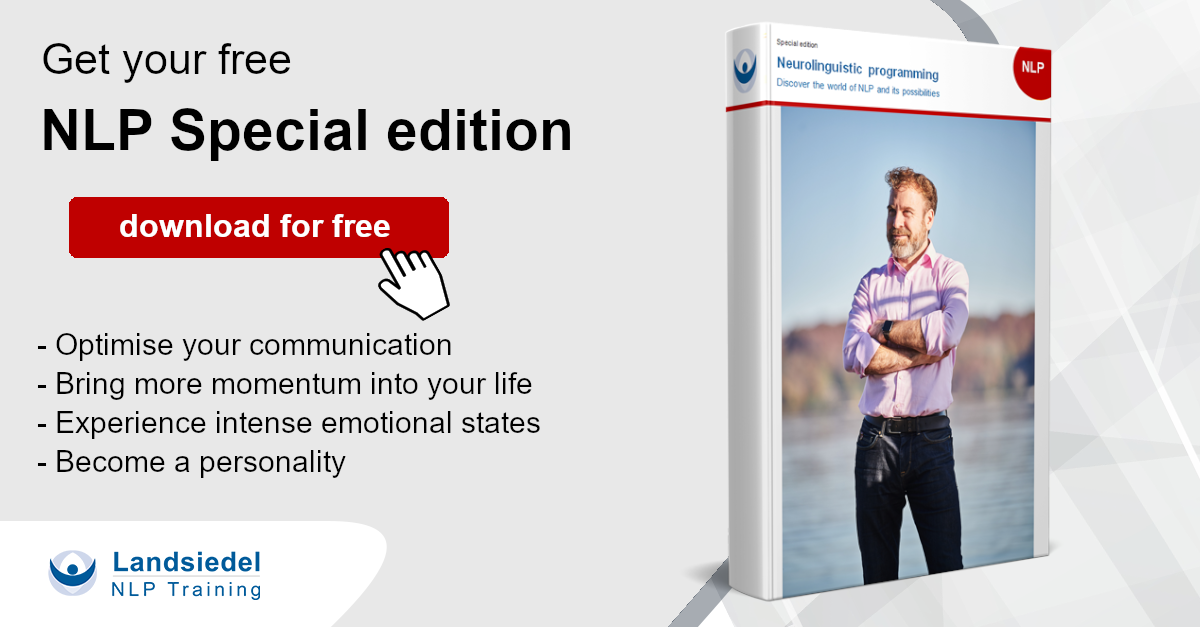NLP Trainer
What is an NLP Trainer?
An NLP Trainer has already successfully completed the trainings as NLP Practitioner, NLP Master and NLP Trainer and can conduct NLP trainings themself.
NLP Trainer Training
With the NLP trainer training you create the prerequisites to be able to train in NLP yourself. An NLP trainer should live NLP. They should be an authentic example of how to live and train with elegance and flexibility. Their tools and methods allow them to inspire and motivate themself as well as other human beings. The NLP Trainer Training helps them to develop into a congruent and authentic trainer.
The NLP trainer training teaches effective techniques to inspire your audience as a teacher, trainer or presenter. The participants of the NLP trainer Training learn how to design courses in a brain-friendly way and how to make the seminar entertaining and exciting.
The training to become an NLP trainer according to the standards of the IN (International Association of NLP-Institutes) addresses two target groups. On the one hand, the training provides the necessary skills and knowledge to conduct NLP trainings yourself. Your NLP know-how is tested both theoretically and practically. On the other hand, the training is interesting for participants who would like to design their courses, lectures and workshops professionally with the help of NLP.
The NLP training to become a trainer is about the development and growth of your own congruence and authenticity. It is about becoming a living example of what you teach. It is also about applying NLP at the highest level, expanding your pedagogical and communicative skills, developing a respect for yourself and other people and their model.
- Integrating the basics and basic assumptions of NLP into your own life
- Consolidation of all NLP modules in theory and practice by applying them to the training context
- Have effective courses and lectures
- Apply complex presentation designs
- Trainer profile and trainer marketing
- Work on the trainer personality
- On-Stage and Performance Training
- Utilisation and control of group processes

Requirements NLP trainer training:
Prerequisite for the certification of the training is a completed NLP Practitioner training as well as a completed NLP Master Training.
Trainer skills and criteria for evaluation and certification:
- Reporting skills, ability to demonstrate and explain techniques and content, to switch between form and content
- Professional self-management, emotional stability, stress resistance, ability to compromise and make decisions
- Behavioural competence to apply NLP techniques and methods openly and covertly
- Integration of the NLP basic assumptions on behaviour level in group contexts
- Ecological working with individuals and groups, utilising group processes and participant resources as well as competence in group leadership and conflict management
- Control contents and processes on different logical levels
- Knowledge of psychological and neurobiological concepts, psychotherapeutic methods and common communication models as well as their integration into the NLP model
Minimum contents:
- Presentation design: setting opening and closing frameworks, formulating goals, comparing goals and results, styles of information transfer, methodical planning of presentations considering different representation systems, meta-programs, learning strategies
- Chunking information and experience, harnessing skills and knowledge across contexts and time
- Pacing, Rapport and Leading by/with groups and individuals at different levels and with different methods
- Creating an atmosphere that supports learning
- Exercise design: definition of the objective of the exercise, open and concealed learning, integration and use of what has already been learned, separation of perception and evaluation in group phenomena, sensory specific
- Feedback for groups and group processes, flexible adaptation to the skills of the group, future pace of learning outcomes
- Application of visual presentation techniques
- Metaphorical process instructions and preframings
- Provide feedback at different levels for groups and individual interventions with individuals and groups in a planned, proactive and reactive manner
- Targeted expansion of the own model of the world
- At least two presentations in front of a qualified group of at least six participants, each longer than 20 minutes, with pre-set tasks and feedback from the group and the teacher trainers.

Which topics and content does the training cover?
Work on the trainer personality
Apart from the knowledge and action competence on a high level, this training as NLP trainer is, among other things, about dealing with the essential topics on the identity level, which are connected with the trainer activity:
- What kind of trainer do I want to be?
- Congruence and authenticity
- Visions and goals as a trainer
- What does it mean for me to lead and teach?
- Self-management and self-coaching
- Dealing with fears about training
Training and exercise design
Here the methodical and didactical seminar design is examined more closely. Techniques such as
- The cycle of learning
- Learning and memory
- 4-Mat-System
- CPPP - Concept
- Motivation model from McClelland
- Nested Loops
- The 3-R method (from Salgado)
- Grinder presentation format
- Preframing and framing
- metaphors and stories
- use of games
- chunking
And the like, as well as the sequence of learners and its translation into practical exercises. The programme also includes the efficient conducting of feedback and debriefing rounds.
.Trainer marketing and profile
For a trainer it is not only important to make good courses. He also has to find clients and customers who will engage him or register for his courses.
- training of the own brand
- Positioning on the market
- Targeted use of the concentration strategy
- From letter to online marketing
- Trainer networks and social media
Evaluation of trainings
Do courses really bring something to the customer? How can this be proven? What can a trainer do to convince current and potential clients of himself and his performance?
- Concepts for the evaluation of trainings
- Model by Kirkpatrick
- Three streets of learning
- Factors influencing training and transfer success
Demonstrations in front of the group
Good demonstrations of NLP techniques are the core of a good NLP training. Therefore it is important to pay attention to some points.
- Selection of the demo subject
- Performance of the demo
- involvement of the group
- Explanations about the demo etc.

What our customers say:

Registration
No dates available yet. If you want to be informed about our newest dates then register for our newsletter by downloading our free NLP Special Edition E-Book.